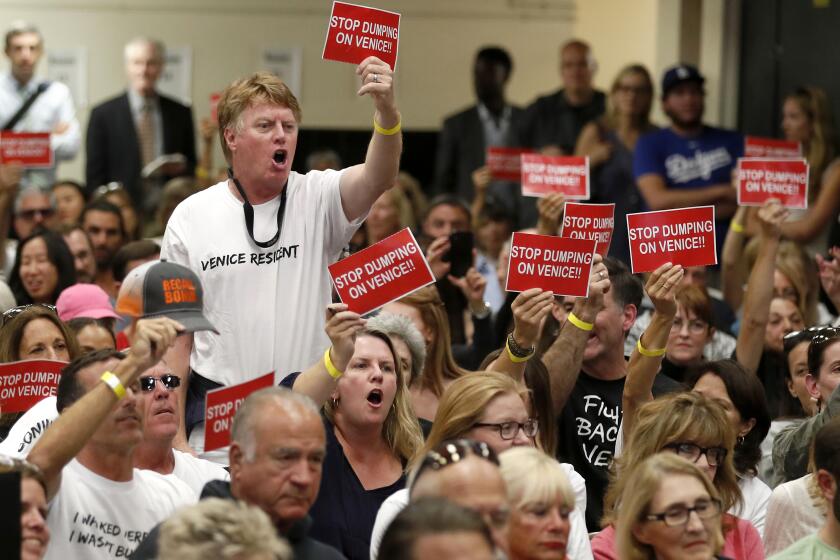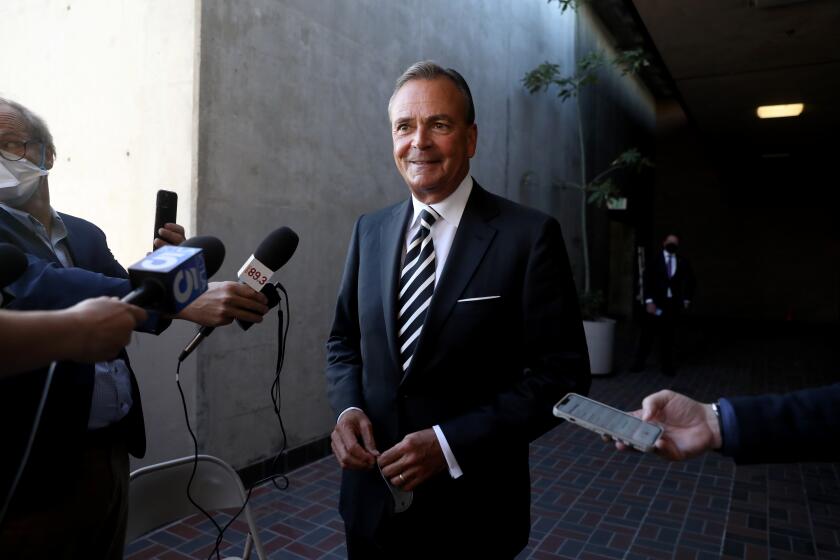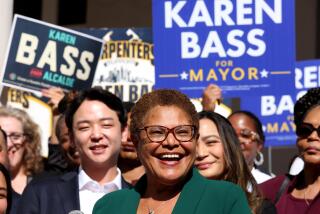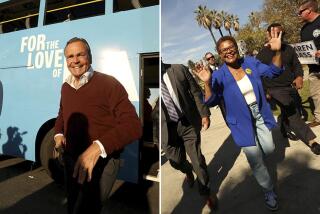Protesters shout down candidates in raucous L.A. mayor debate
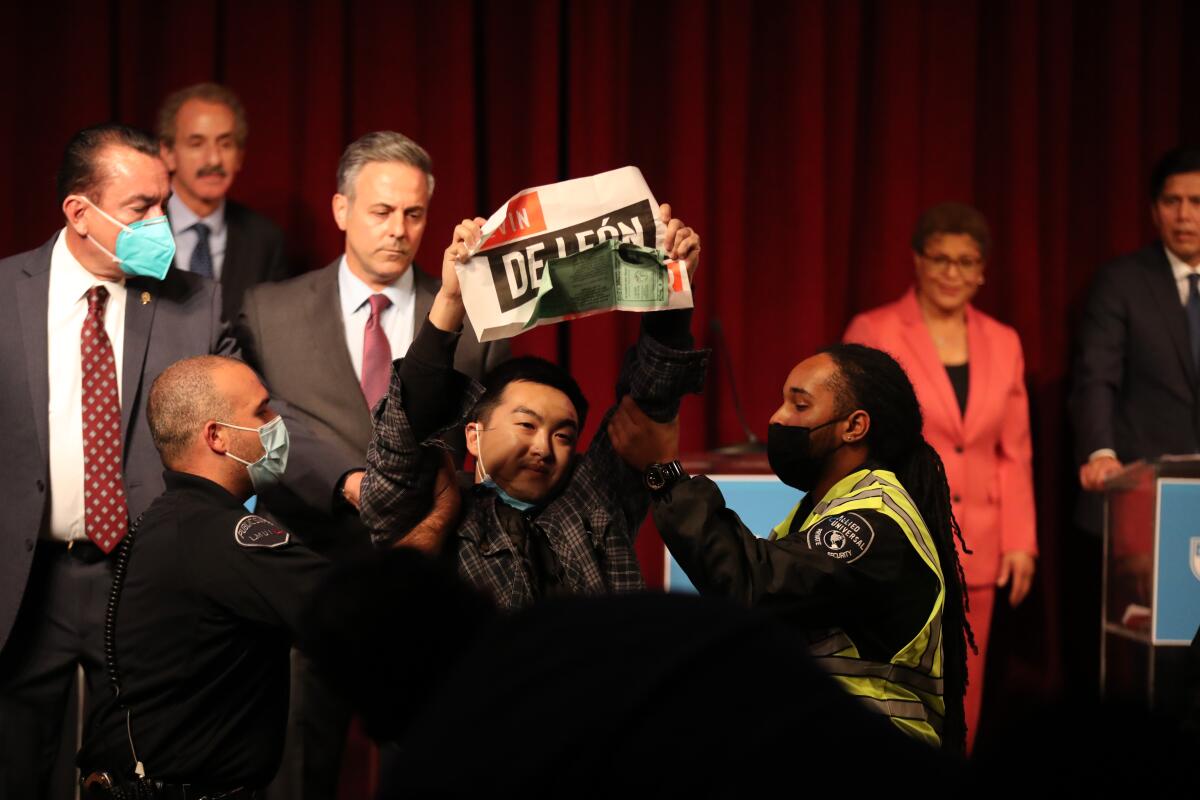
- Share via
Five leading candidates for mayor of Los Angeles squared off Tuesday night in the first televised debate of the campaign, but the most stinging barbs of the evening were directed at a sixth candidate who didn’t attend — billionaire and civic activist Rick Caruso.
City Atty. Mike Feuer suggested that Caruso had not done enough as chairman of USC’s board of trustees to protect the safety of women on the campus. Councilman Joe Buscaino accused the first-time political candidate of being anti-union, in a city he said was built by organized labor.
The digs came toward the end of an hourlong debate at Loyola Marymount University, where Feuer and Buscaino faced Councilman Kevin de León, U.S. Rep. Karen Bass and former Metropolitan Transportation Authority board member Mel Wilson.
Caruso did not attend because of a scheduling issue, his spokesperson said, but he plans to be at future debates, including one scheduled for May 1.
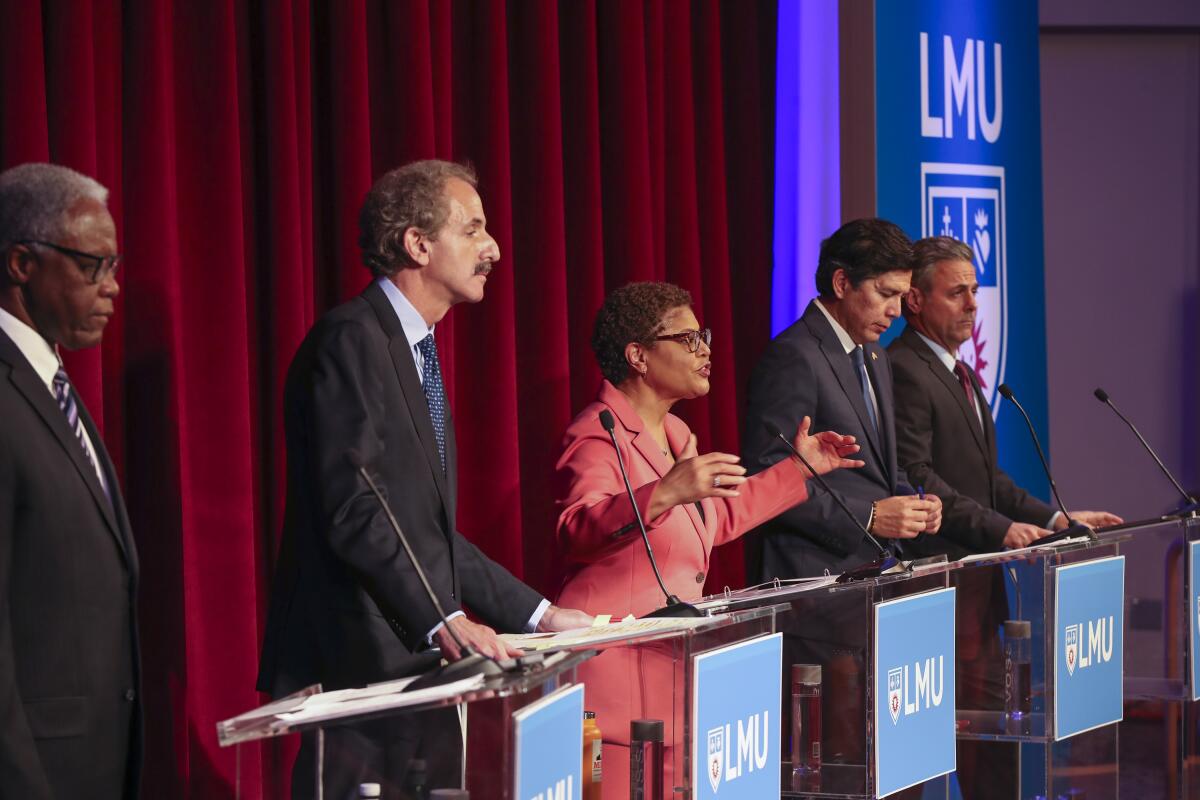
While Caruso took the sharpest criticism from the stage, the most aggressive attacks came from the audience, where a small group of protesters jumped to their feet and began shouting down the candidates, apparently in response to statements supporting the police.
“No one wants more cops in Los Angeles!” shouted one man, as most of the audience booed and called for order. That prompted one protester to respond: “You in this overwhelming white room are booing people of color! You are booing Black and brown people!”
Quality-of-life issues, voter disgust, fear-mongering: is this politics in L.A. or O.C?
The first outburst was quelled, only to have another erupt a few minutes later. A total of six people were eventually escorted by security guards out of the auditorium, where they were released.
The five candidates and Caruso are considered the most likely to succeed Mayor Eric Garcetti, who is leaving his post after two terms. They will compete in a June 7 primary, with the two top finishers competing in a Nov. 8 runoff.
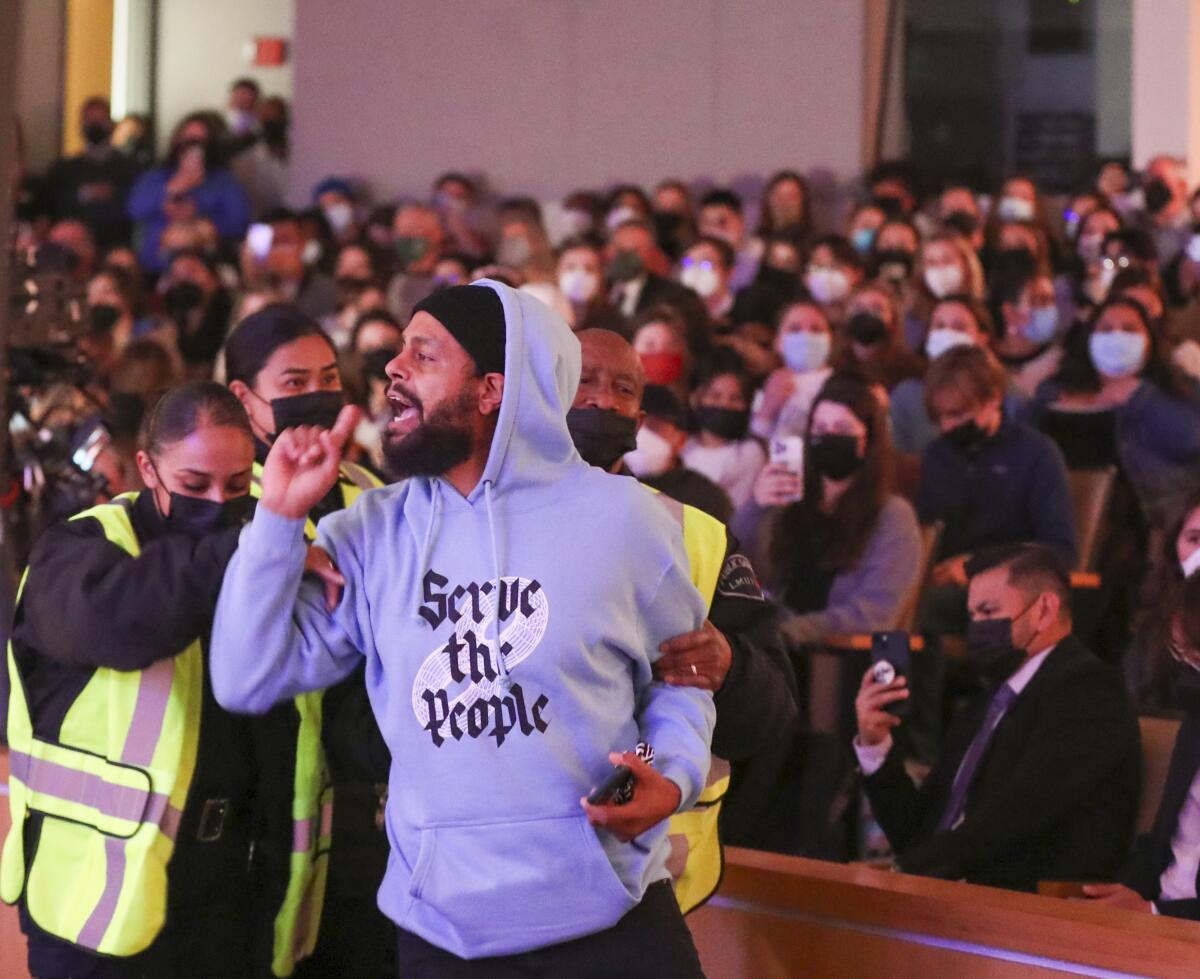
The debate was most notable for what the candidates agreed on: Following a year in which the city’s elected leaders agreed to cut funding for the LAPD, four of the would-be mayors said they would increase the size of the force and one would maintain it at its current level of about 9,700 officers.
Buscaino has pledged to increase the LAPD to 11,000 officers, while Wilson said he would add 1,500 officers, to exceed that mark. Feuer has called for a return to a 10,000-member force. Bass said she would add 200 officers to the current total and de León said he would maintain the ranks at present levels.
Given polls showing homelessness to be the No. 1 concern of voters, Tuesday’s showdown was aptly timed — coming on the same night that officials launched a “point-in-time” count of unhoused people in the greater Los Angeles region.
Wilson was alone among the candidates in declining to call homelessness the No. 1 issue in the race. (He said that a variety of challenges, including the need for better economic development, were most important.)
When asked about whether people should be allowed to sleep on the street, the consensus was that they shouldn’t if they’ve been offered a permanent or interim housing placement.
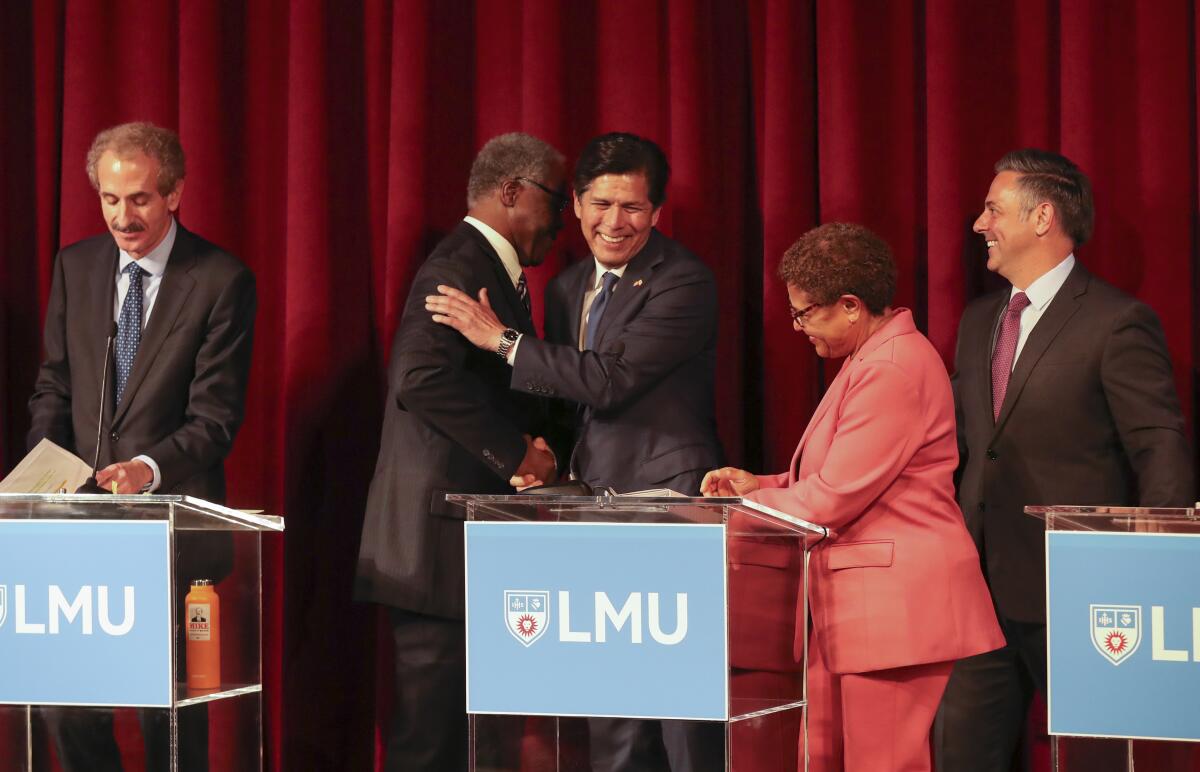
“It’s not progressive to let people die on the streets of L.A.,” De León said, who went on to claim that he’s created more housing opportunities than any other council member since taking office.
Some of the housing provided in De León’s downtown-area district is not permanent, but rather temporary shelter people use as they try to find long-term residences. The amount of new interim housing options in his district is also augmented by the presence of a nearly 500-room hotel that the city has rented to house people since the outset of the pandemic, and well before he took office.
Caruso was largely ignored until the last 15 minutes of the debate, when Feuer hit him on his record at USC and Buscaino attacked him for his financial support of a failed 2005 ballot initiative that would have barred government employee unions from spending members’ dues on political campaigns without consent.
When the debate turned to crime, Feuer said that one-third of the women at USC had reported being sexually assaulted sometime during their college years in a 2019 survey.
“A third is not an accident, a third is a culture,” the city attorney said. “If he couldn’t keep the women of USC safe, how is he going to keep the women in the city of Los Angeles safe?”
Caruso issued a statement calling Feuer’s attack “not accurate,” and added that the sexual assaults were largely tied to a campus gynecologist, who was terminated and a huge settlement paid to victims.
“None of these things happened on my watch,” Caruso said. “The payout of a billion dollars we did because we made the decision that terrible things happened before I was chair. We had to do right by the students who were harmed by this horrible doctor. We stood up to do the right thing.”
He said he had taken over as chair at USC in a time of crisis, adding that it was “no different than today with the city of L.A. which is in a time of immense crisis.”
The real estate company that bears his name will get a new CEO if Caruso is elected and the firm enters a blind trust.
Buscaino’s shot at Caruso came just a few minutes later. The councilman noted that his heavily union district, which includes San Pedro, would not warm to a candidate who was not pro-labor.
“There’s one candidate who’s not here today who supported doing all he could to silence our working families and unions,” Buscaino said, adding that the initiative “would have silenced cops, firefighters, teachers, electricians.”
Get the lowdown on L.A. politics
Sign up for our L.A. City Hall newsletter to get weekly insights, scoops and analysis.
You may occasionally receive promotional content from the Los Angeles Times.
Caruso said he was being attacked on 17-year-old political contributions that went to a package of ballot propositions. Given the U.S. Supreme Court’s Citizen’s United decision, allowing unlimited corporate contributions to campaigns, Caruso said he believes that unions “should have the right to use every tool at their disposal to even the playing field.”
The protesters left the loudest mark on the evening. The auditorium erupted in laughter when the debate’s moderator — Fernando Guerra of Loyola Marymount’s Center for the Study of Los Angeles — began to ask a question about “civic discourse.”
One of those who was removed from the room, Matyos Kidane, tried to speak directly to Bass, saying afterward that he spoke out because he wanted to challenge the “sham debate” that he said was underway.
“These are all effectively the same candidates,” Kidane said. “There seems to be this notion that there is this wide breadth of candidates across the political spectrum, when in reality, they’re all enforcing the status quo, they’re all asking for the LAPD to be increased, their solutions are all criminalization, when that’s not what Angelenos want.”
Bass made no obvious slip-ups or faux pas that might endanger her early lead in the polls.
Like many of her competitors, she said the city had to be able to pursue more than one priority at a time; for example supporting police but insisting they treat people equitably.
“There shouldn’t be guardian-style policing in wealthy areas and warrior-style policing in communities. of color,” Bass said. ”But, really, if we are going to address policing and violence, we have to understand history and not repeat history and understand that we cannot arrest our way out of our problems.”
A recent UC Berkeley Institute of Governmental Studies poll co-sponsored by The Times found that 44% of likely voters do not know enough about Bass to have an opinion on her.
The anonymity runs even deeper for the other leading candidates. More than 60% of likely voters said they didn’t know enough about De León, Buscaino, Feuer or Caruso to form an opinion.
Times staff writer David Zahniser contributed to this report.
More to Read
Sign up for Essential California
The most important California stories and recommendations in your inbox every morning.
You may occasionally receive promotional content from the Los Angeles Times.
